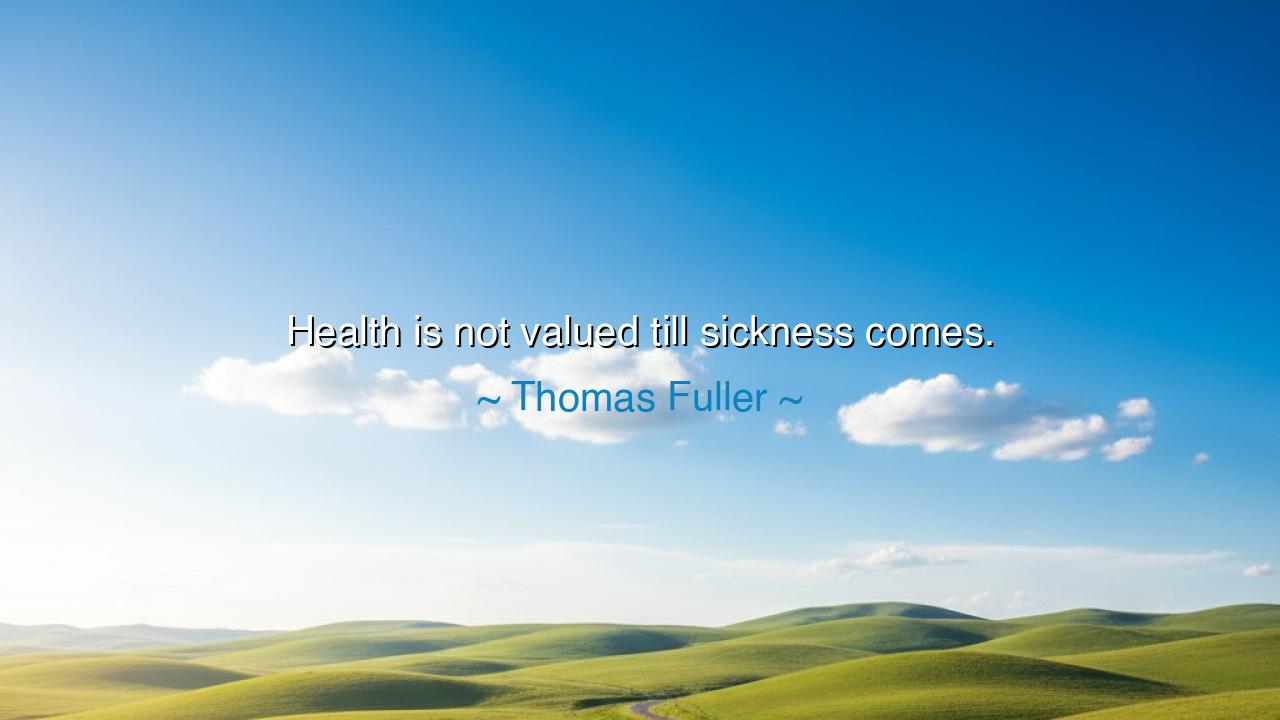
Health is not valued till sickness comes.






The English clergyman and historian Thomas Fuller, writing in the seventeenth century, once observed with eternal truth: “Health is not valued till sickness comes.” His words, though born in another age, speak as directly to our hearts today as they did to his own. For in these few syllables lies one of life’s greatest tragedies — that man, surrounded by gifts beyond measure, rarely cherishes them until they are gone. Fuller, who lived through the dark years of plague and unrest, knew that health, like time and breath, is among the treasures most taken for granted — until pain, frailty, or death reminds us of its worth.
To understand the depth of this saying, we must first reflect on human nature itself. The body, when whole and strong, moves like a silent servant, asking for little yet granting everything. We rise, we walk, we speak, we dream — and scarcely think of the miracle that makes these acts possible. It is only when sickness lays its hand upon us, when the heart stumbles or the breath shortens, that we see how fragile life truly is. Then we remember that health was never a right, but a blessing — a delicate flame we were meant to guard with care. Fuller’s words are not a condemnation, but a call to awaken — to see the sacred in what seems ordinary, and to honor the body before pain teaches us its value.
Fuller wrote during a time when illness often meant death, when the simplest fever could sweep away whole families. He saw how men who ignored their well-being in days of strength were brought to humility in days of weakness. His own writings carry a tone both moral and compassionate — born of a man who had witnessed suffering and wished others to live wisely. In his view, neglect of health was not merely a physical folly, but a spiritual blindness. To disregard the body, the temple of the soul, was to dishonor life itself. “Health is not valued till sickness comes” — this was his reminder that gratitude must precede loss, not follow it.
History has borne witness to this truth again and again. Consider the story of John Keats, the young English poet of the Romantic age. His verses sang of beauty, nature, and love — yet his body, frail from youth, carried the shadow of tuberculosis. As his illness deepened, he wrote that he could see the “cold hand of death” on his own heart. In those final years, every moment of breath became precious, every sunrise a gift. Though Keats lived only twenty-five years, his poetry glows with the awareness of what most of us forget — that health and life are not endless. His suffering, like Fuller’s warning, teaches us that what we fail to treasure in wellness becomes sacred only when it begins to fade.
But Fuller’s wisdom reaches beyond sickness into the realm of the soul. For the same blindness that makes us forget the body also makes us forget the spirit. Just as the healthy man forgets gratitude for his strength, the peaceful man often forgets gratitude for his peace. Only when turmoil comes — when the heart aches or the world grows dark — do we long for what was once so easily ours. In this way, Fuller’s words speak to a universal law: that human beings learn the worth of what they have only in its absence. Yet the wise, forewarned by his teaching, can break this pattern — by choosing awareness before loss.
The lesson, then, is clear and timeless: do not wait for illness to remember the value of health, nor for loss to remember the value of joy. Each day that you wake without pain, each step that your feet take without struggle, is a silent miracle. Be grateful for it. Protect it. Nourish it. Eat with mindfulness, rest with reverence, breathe with gratitude. For the greatest healer is not medicine, but appreciation — the act of honoring what you already have.
And so, let Thomas Fuller’s words echo like a bell across generations: “Health is not valued till sickness comes.” Cherish your body before it breaks; tend to your soul before it hungers; treasure your days before they pass. The wise do not wait for suffering to teach them reverence — they live with it already in their hearts. For when health is honored in its season, life itself becomes richer, and gratitude becomes the medicine that keeps both body and spirit whole.






AAdministratorAdministrator
Welcome, honored guests. Please leave a comment, we will respond soon